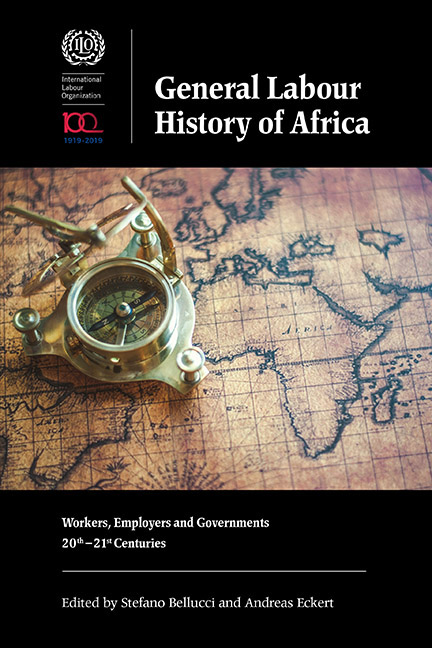Book contents
- Frontmatter
- Contents
- List of Maps and Figures
- List of Tables
- Notes on Contributors
- Foreword
- Acknowledgements
- The ‘Labour Question’ in Africanist Historiography
- Part I Free and Unfree Labour
- Part II Key Sectors
- Part III International Dimensions and Mobility
- Part IV Varieties of Work
- 10 Domestic Work
- 11 Military and Police
- 12 Crime and Illegal Work
- 13 White-Collar Workers
- 14 Sport, Tourism and Entertainment
- Part V Entrepreneurs and Self-Employment
- Part VI The State, Unions and Welfare
- Part VII Conclusions
- Select Bibliography
- Index
13 - White-Collar Workers
from Part IV - Varieties of Work
Published online by Cambridge University Press: 21 September 2019
- Frontmatter
- Contents
- List of Maps and Figures
- List of Tables
- Notes on Contributors
- Foreword
- Acknowledgements
- The ‘Labour Question’ in Africanist Historiography
- Part I Free and Unfree Labour
- Part II Key Sectors
- Part III International Dimensions and Mobility
- Part IV Varieties of Work
- 10 Domestic Work
- 11 Military and Police
- 12 Crime and Illegal Work
- 13 White-Collar Workers
- 14 Sport, Tourism and Entertainment
- Part V Entrepreneurs and Self-Employment
- Part VI The State, Unions and Welfare
- Part VII Conclusions
- Select Bibliography
- Index
Summary
The term ‘white-collar work’ describes a broad spectrum of non-manual paid employment, including relatively low-level clerical jobs, mid-level planning and accounting functions, and high-level managerial roles. Whitecollar workers are found in trading, banks and other service industries, in the offices of industrial enterprises, and as part of the civil service. The explicit distinction between white-collar workers and blue-collar workers (those engaged in manual labour) is associated with industrial societies. The term's focus on dress does not just refer to the practice that manual workers often have to wear blue overalls while office workers are expected to wear white shirts: it also refers to differing expectations of education, career advancement and habitus. White-collar workers tend to operate in a safer and cleaner working environment, get paid more and are usually better qualified than blue-collar workers. Thus, even those in low-level clerical positions may consider themselves superior to manual workers, as has been frequently the case among African clerks. In twentieth-century Africa, the primary contrast to white-collar work was not necessarily blue-collar work, as most African economies retained large percentages of agricultural labourers and of workers in the informal sector. Indeed, white-collar workers made up only a small percentage – generally less than 5 per cent – of the total number of workers. Their roles, however, tended to make them quite visible, and they were over-represented among those who functioned as intermediaries between the (post-)colonial state and the population.
The history of white-collar work in African societies is associated with colonial administrations, postcolonial bureaucracies and expatriate business. However, white-collar work existed in Africa before the coming of colonial rule (although without a dress code involving a white shirt): African merchants employed clerks and managers; some African polities employed bureaucrats and diplomats; and European traders and missionaries employed African clerks and agents. During the nineteenth century, Western-style educated Africans from Sierra Leone and Senegal in particular were recruited as whitecollar workers and sent across West and West-Central Africa. When colonial rule was established across Africa during the final decades of the nineteenth century this had a quantitative impact on white-collar work, increasing the demand for such employees.
- Type
- Chapter
- Information
- General Labour History of AfricaWorkers, Employers and Governments, 20th-21st Centuries, pp. 379 - 404Publisher: Boydell & BrewerPrint publication year: 2019

